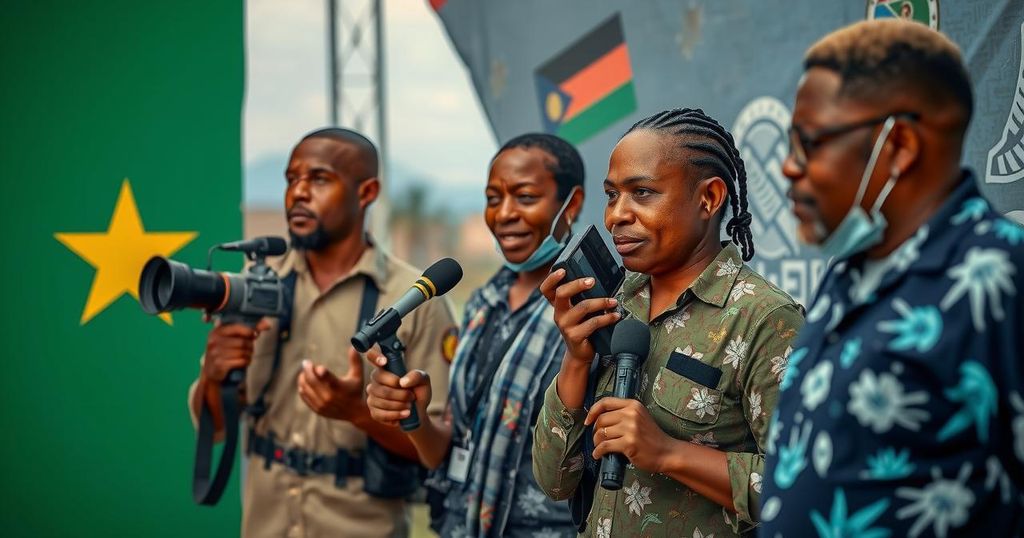A Nigerian news outlet has called for the release of its detained journalists in Mozambique amidst rising violence against the media. Two reporters went missing while covering protests in Maputo, following claims of electoral misconduct and unrest after recent elections. The Media Institute of Southern Africa is demanding their immediate release and condemning attacks on journalists during these tumultuous times.
A Nigerian news agency has publicly urged for the release of two of its journalists, Bongani Siziba and Sbonelo Mkhasibe, who went missing while covering anti-government protests in the Mozambican capital of Maputo. Both journalists, along with Mozambican translator Charles Mangwiro, were detained under unclear circumstances. News Central TV’s editor-in-chief, Kayode Akintemi, expressed deep concern for the missing journalists and stated that attempts to contact them had been unsuccessful. News Central is actively pursuing diplomatic avenues to achieve their immediate release. In response to the detentions, the Mozambique office of the Media Institute of Southern Africa (MISA) has demanded that the government provide an immediate and unconditional release of the detained individuals, as well as a thorough explanation of their circumstances. MISA stressed that journalism is not a crime, and journalists should not face kidnappings or arbitrary detentions. The agency’s call comes amid reports that two other local journalists were recently attacked while covering violent unrest in the city of Nampula, where two people were killed during clashes. These events follow a police crackdown on protests related to the recent elections, which have claimed at least 30 lives according to Human Rights Watch. The growing tensions within Mozambique can be attributed to the ruling Frelimo party’s contentious election victory on October 9, during which more than half of the electorate abstained. The independent opposition candidate, Venancio Mondlane, has accused the ruling party of election rigging and has encouraged protests, which have often resulted in violence. In the backdrop of this unrest, digital rights organizations have reported multiple instances of internet and social media shutdowns, which further complicate the situation for journalists and citizens alike. The election turmoil has had significant socioeconomic implications, with border closures causing major disruptions to trade with South Africa, as Mozambican ports are critical for South African exports. Overall, the call for justice by News Central and the MISA highlights the need for protection and respect for press freedoms in Mozambique, particularly amidst increasing state-sponsored violence and suppression of dissent.
The current situation surrounding press freedoms in Mozambique is alarming, marked by the detention of journalists and increasing violence against those reporting on protests. Recent elections have fueled unrest, as allegations of electoral fraud have galvanized opposition supporters. The political landscape in Mozambique has been tumultuous, with demands for accountability and increased civil liberties emerging against a backdrop of long-standing authoritarian governance by the Frelimo party, which has dominated since independence from Portugal in 1975. This climate has seen significant repercussions for journalists, who are often targeted while fulfilling their professional duties in challenging environments. Moreover, the government’s action, including internet shutdowns, demonstrates a concerted effort to control narratives and limit dissent within the country.
In conclusion, the call by News Central TV for the release of its detained journalists spotlighted the precarious situation for press freedom in Mozambique. With a history of violence against journalists and the misuse of state power, there is a pressing need for accountability and protection for those tasked with uncovering the truth. The demands of MISA for an explanation and the unconditional release of all detained journalists emphasize the critical role that a free press plays in a democratic society. Additionally, the ongoing unrest highlights broader issues surrounding governance and civil liberties in Mozambique, with implications for foreign relations and economic stability due to disruptions at key trade routes.
Original Source: www.dw.com







